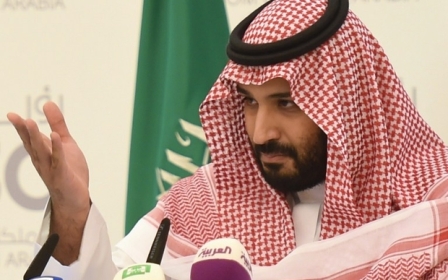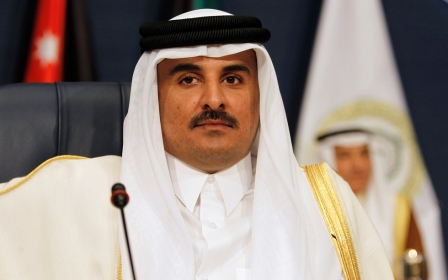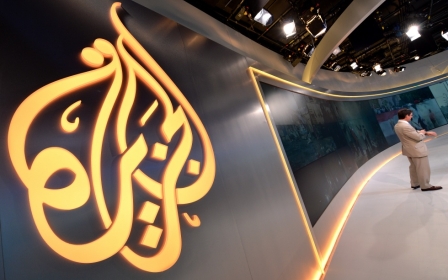As Tillerson calls for calm, Trump calls out Qatar on terrorism funding
Hours after his secretary of state urged Saudi Arabia and its regional allies to ease their blockade imposed on Qatar, US President Donald Trump on Friday called on the Gulf state to stop funding groups that commit terrorism.
Trump said Qatar has historically financed such groups "at a very high level".
Saudi Arabia, the United Arab Emirates, Egypt and Bahrain severed ties with Qatar on Monday over long-standing allegations that Qatar was courting Iran and fomenting instability in the region, charges that it denies.
Trump appeared to take responsibility for the diplomatic crisis.
"We had a decision to make, do we take the easy road or do we finally take a hard but necessary action," he said. "We have to stop the funding of terrorism. I decided ... the time had come to call on Qatar to end its funding."
The US president also demanded that Qatar and other nations that he said he does not want to name stop supporting "extremist ideology".
He thanked Saudi Arabia and "my friend King Salman" for hosting a summit for Muslim leaders during his visit to Riyadh.
Saudi Arabia and Bahrain welcomed on Trump's demand on Saturday but did not respond to a US Department of State call for them to ease pressure on the Gulf state.
After severing ties with Qatar on Monday, Saudi Arabia said it was committed to "decisive and swift action to cut off all funding sources for terrorism" in a statement carried by state news agency SPA attributed to "an official source".
In a separate statement, the United Arab Emirates praised Trump's "leadership in challenging Qatar's troubling support for extremism".
Trump's accusation came as even as the Pentagon and US Secretary of State Rex Tillerson cautioned against the military, commercial and humanitarian effects of a blockade imposed by Arab states and others.
A separate SPA report on Saturday acknowledged Tillerson's call for Qatar to curtail support for terrorism, but did not mention his remarks that the crisis was hurting ordinary Qataris, impairing business dealings and harming the US fight against the Islamic State militant group.
Saudi Arabia said its action followed the conclusions of last month's Arab Islamic American Summit in Riyadh, where Trump delivered a speech about Islamic extremism.
Trump’s hard-line statements against Doha seemed to contradict what Secretary of State Tillerson had said earlier on Friday.
'Confusion'
While calling on Qatar to do more against terror funding, Tillerson warned that the crisis must not disrupt action against the Islamic State (IS) group. He also criticised the blockade by Qatar’s neighbours on humanitarian grounds.
"Our expectation is that these countries will immediately take steps to de-escalate the situation and put forth a good faith effort to resolve their grievances they have with each other," Tillerson said in a brief statement to reporters.
"We call on the kingdom of Saudi Arabia, the United Arab Emirates, Bahrain and Egypt to ease the blockade against Qatar."
Tillerson said the blockade was causing food shortages, the forced separation of families and children being pulled out of school.
"We believe these are unintended consequences, especially during the holy month of Ramadan," he said.
The UAE welcomed Trump’s approach, saying that Qatar must acknowledge concerns about its "troubling support for extremism".
"The next step is for Qatar to acknowledge these concerns and commit to reexamine its regional policies," the UAE ambassador to the US, Yousef Al Otaiba, said in a statement.
Ronald Stockton, a political science professor at the University of Michigan-Dearborn, said the contradictions between Trump and members of his administration are not politically normal.
"We have a president who has no experience with world affairs," Stockton told Middle East Eye. "He seems not curious about what is happening. He appears not to listen to his briefers."
Stockton added that Trump is impulsive and lacks the understanding that the presidency is an institution, not a person.
"He's creating great disconnect and confusion and stresses in the world because of this," the professor said.
Trump spoke by phone on Friday with Egyptian President Abdel Fattah al-Sisi to discuss Qatar and the need for Gulf unity, a senior administration official said.
It was the fourth call Trump has had with a regional leader since Gulf allies severed diplomatic ties with Qatar on Monday over long-standing allegations that Doha is courting Iran and supporting militant groups, charges that Qatar denies.
New MEE newsletter: Jerusalem Dispatch
Sign up to get the latest insights and analysis on Israel-Palestine, alongside Turkey Unpacked and other MEE newsletters
Middle East Eye delivers independent and unrivalled coverage and analysis of the Middle East, North Africa and beyond. To learn more about republishing this content and the associated fees, please fill out this form. More about MEE can be found here.




